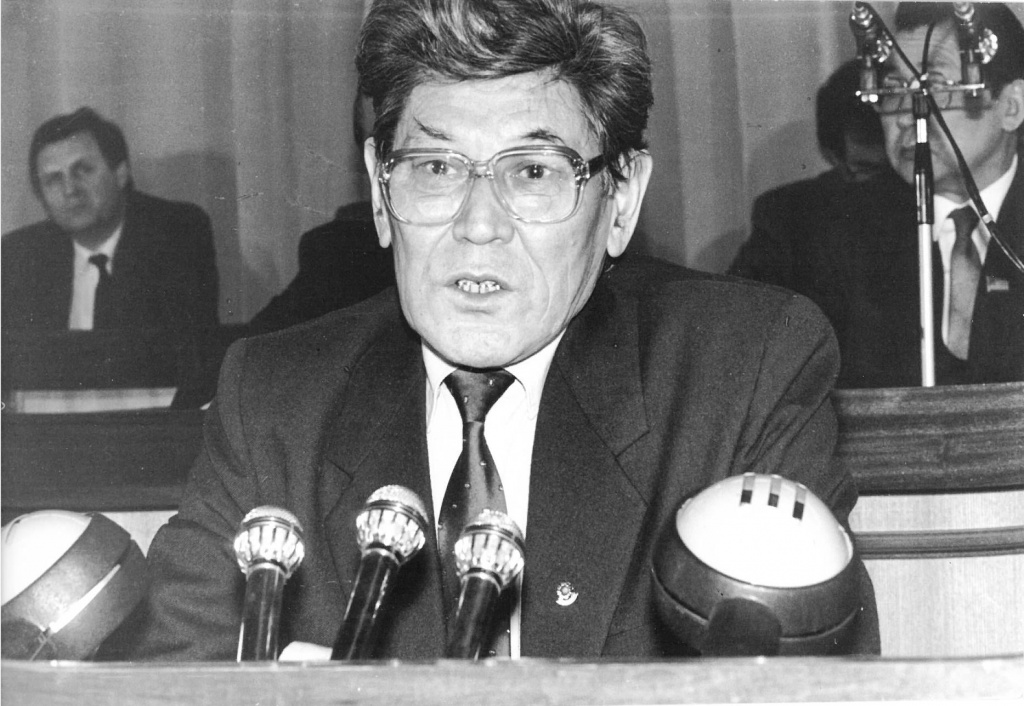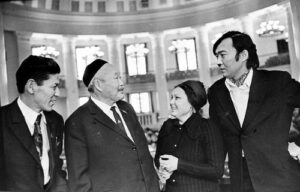ASTANA – On May 12, Kazakhstan celebrates the 95th anniversary of Anuar Alimzhanov, a prominent Kazakh journalist and historical writer whose works brought to life key figures of Kazakh history, from the renowned 10th-century philosopher Abu Nasr Al-Farabi to the 19th-century poet and warrior Makhambet Utemisov.

Anuar Alimzhanov. Photo credit: e-history.kz
Alimzhanov could write engagingly and summarize complex historical circumstances into compelling, accessible narratives – gifts which brought him a flourishing career: first, as a journalist, and later as a writer.
Early life and career
Alimzhanov was born in 1930 in Karlygash village of the Zhetisu Region. He was raised in an orphanage since early childhood.
In 1949, he enrolled in the faculty of journalism at Kazakh State University, now Al-Farabi Kazakh National University, in Almaty in 1949.
After graduating, Alimzhanov began his journalism career as a correspondent for Literaturnaya Gazeta (Literature Newspaper), covering Central Asia and Kazakhstan.
Between 1963 and 1967, he served as editor-in-chief of the renowned Kazakhfilm studio, playing a key role in shaping the country’s cinematic narrative. In 1968, he was invited to become Kazakhstan’s correspondent for Pravda, the official newspaper of the Soviet Union. The following year, he took on the role of editor-in-chief of the influential literary weekly Kazakh Adebieti (Kazakh Literature).
During a literary and journalistic career spanning almost 40 years, Alimzhanov was often described as direct.
“There are people whose communication evokes a sense of their historicity. From the very first stage of his work in the newspaper, he showed himself as a person who feels very well the global processes that were taking place at that time. I was then a student of the faculty of oriental languages at Moscow State University, a member of the Zhas Tulpar (Young Tulip) movement. The times were favorable for freethinking and we were patriots,” said a renowned Kazakh orientalist and culturologist Murat Auezov about Alimzhanov in a 2010 interview with the Caravan newspaper.
Alimzhanov was also one of the few activists advocating for nuclear disarmament, alongside fellow Kazakh poet and prominent public figure Olzhas Suleimenov.
“Two personalities – Olzhas Suleimenov and Anuar Alimzhanov – shaped our feelings to a great extent. Olzhas influenced us emotionally, and Anuar – through reason and knowledge. It was through him that we learned about Turkic-Indian ties, the names of Babur and Akbar, the Mughal dynasty. Kazakhstan read his ‘Souvenir from Otrar’ and discovered new layers in its history. Anuar seemed to explode the temporal and chronological boundaries that were prescribed by the ideological apparatus,” said Auezov.
Historical novelist
His first experience in historical prose was the short story “Souvenir from Otyrar” published in 1966. From that point on, Alimzhanov turned to a large genre of historical novels. One after another, his historical works were published, eventually forming a sweeping cycle of narratives that trace nearly a thousand years of Kazakh history and the fate of its people.

Anuar Alimzhanov with Kazakh writer Sabit Mukanov, singer Roza Baglanova and poet Olzhas Suleimenov. Photo credit: caa-network.org
In his biographical novel “The Return of the Teacher,” Alimzhanov went as far back as the 10th century to explore the life and legacy of Abu Nasr Al-Farabi—one of the greatest minds of the Islamic Golden Age.
With this work, Alimzhanov emphasizes that every nation has made its own contribution to the progress of world civilization. By tracing the path of the philosopher and scientist Al-Farabi, the writer revives a figure revered across the East but often underappreciated in broader historical narratives.
At the outset of the novel, Anuar Alimzhanov humbly declares, “I am neither a teacher, a psychologist, nor a philosopher.” Yet, as one reads “The Return of the Teacher,” it becomes clear that the work holds deep historical and philosophical values.
Another major work, “Makhambet’s Arrow,” published in 1967, centers on the life and struggle of Makhambet Utemisov, a revered 19th-century Kazakh poet, warrior, and national hero. Makhambet Utemisov, known for his passionate poetic voice and fierce resistance to colonial oppression, played a central role in the uprising led by Issatay Taymanov against the exploitation and injustice of the Kazakh nobility allied with the Russian Empire.
While working on his novel about Makhambet, Alimzhanov drew extensively from the oral traditions and stories. Alimzhanov vividly reconstructs Makhambet’s journey: his early experiences at the khan’s court, a pivotal trip to St. Petersburg, his break with the khan, his participation in Taymanov’s movement and its defeat.
Prominent public figure
As early as 1959, Alimzhanov served as deputy chairman of the Soviet Committee for Relations with Writers of Asia and Africa. In this capacity, he became a bridge between continents, engaging with literary minds across the Global South.
“There, in Africa, he was looking for ways to decolonize his people. But he was not only a thinker, he was also a real figure of his time. Gathering the experience of decolonization, he involved Olzhas and Satimzhan [Sanbayev], the entire Union of Writers, and even [Dinmukhamed] Kunayev (the First Secretary of the Communist Party of the Kazakh SSR),” said Auezov.
According to Auezov, Alimzhanov’s life was the true embodiment of what it means to be a public figure.
Beginning in 1986, Alimzhanov took on a leadership role as Chairman of the Kazakh Culture Foundation—a position that placed him at the forefront of preserving and promoting the country’s cultural heritage.
His influence, however, was not confined to cultural spheres alone. He was an active political figure, serving as a deputy of the Supreme Soviet of the Kazakh SSR and later as a people’s deputy from 1990 to 1993.
Alimzhanov passed away in 1993, leaving behind a powerful literary and civic legacy that continues to inspire generations across Kazakhstan and beyond.


